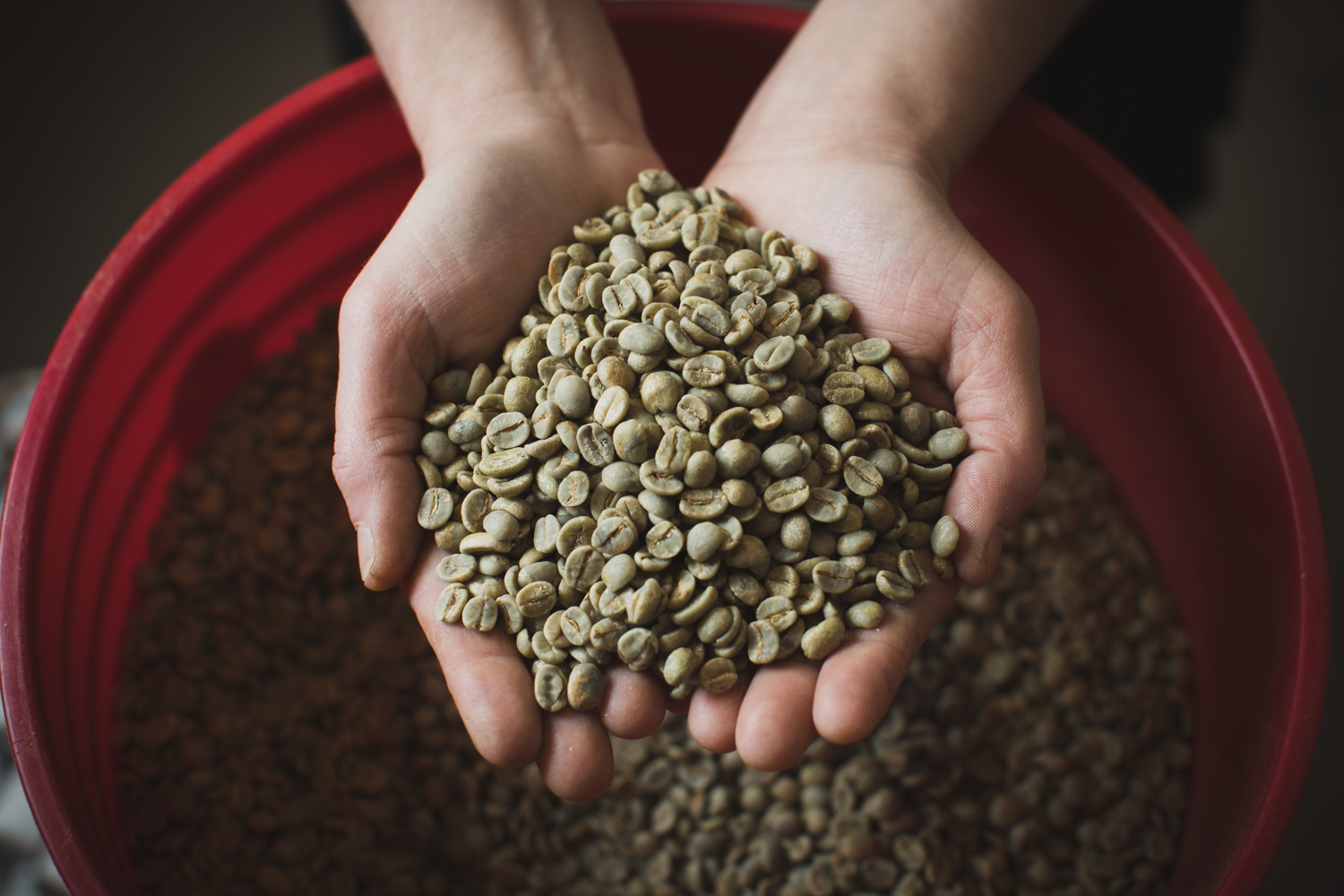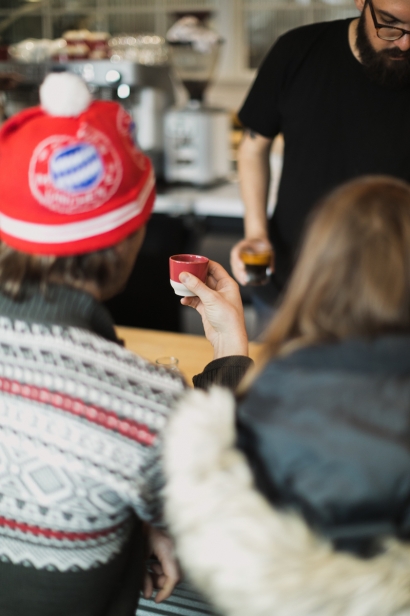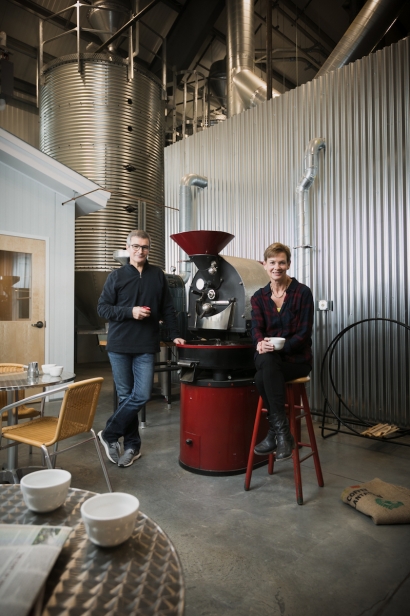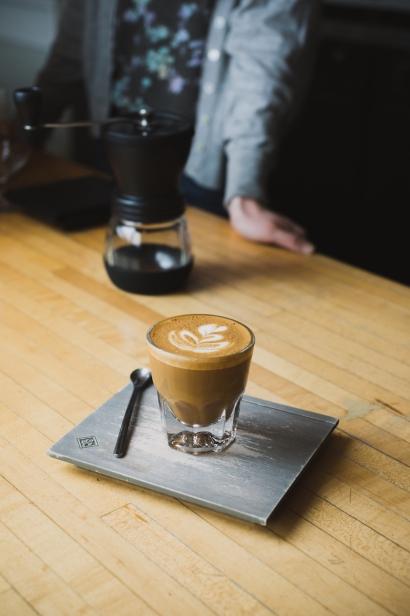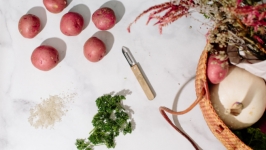Vermont Artisan Coffee & Tea Company
Travel down Route 100 from Stowe toward Waterbury and you will come upon a gleaming new building that is a hub of all things coffee. Vermont Artisan Coffee & Tea Company now occupies a new 15,000-square-foot space that houses their offices, café production facility and coffee school. For those who worship the bean, this is the place to come whether for java education or just a meticulously curated menu of coffees or teas from around the world.
Owner Mané Alves began Vermont Artisan Coffee in 2000, in downtown Waterbury. Mané had previously been in the wine industry in California. He met his wife Holly on a ski lift in Squaw Valley in the ’80s, and they fell for each other fast enough that when Holly was offered the job as head of marketing for Ben & Jerry’s three weeks later, he followed. In Vermont, he started working for Coffee Enterprises in Burlington. As Holly explains, translating his wine skills into coffee was a natural. “They are very similar, they are both agricultural products, both change with weather and climate, terroir, so it wasn’t a big leap to go from wine to coffee.” Holly stayed with Ben & Jerry’s until 1998 and continued marketing for other companies until she shifted over to Vermont Artisan Coffee full-time in 2010.
Mané originally started Coffee Lab International in 1998, which tested coffee for other operations. His work took him to coffee-producing countries to meet with farmers and exporters. In his travels, he discovered exquisite coffees, each embodying the character of the soil and surroundings from which it was grown. It wasn’t a giant leap to start importing his favorites to sell in his new home state. He found a large coffee roaster in Europe and had it shipped to Vermont. The company then sold these coffees to restaurants and co-ops and now have accounts across the state but are mostly concentrated in the greater Burlington area. The Davis Center at UVM and the Skinny Pancake are two of their biggest customers.
In his travels both for buying and teaching about coffee, Man. also found excellent teas. His approach to sourcing the best tea is the same as for coffee; he meets with the actual farmers growing the product, not with the middleman. Vermont Artisan now imports 16 different teas from China, India and Sri Lanka.
Although the company offered products from around the world, local weather impacted their plans. In 2011, Tropical Storm Irene flooded the Winooski River near their facility and heavily damaged the building. The giant roaster stationed on the ground level was submerged under three feet of water. When the waters finally receded, there were some tense moments as they attempted to start it up again. They succeeded, but Holly says at that point, if the roaster had been damaged beyond repair, their roasting venture would have ended. The cramped space and threat of future floods convinced Man. to move the operation to higher ground, in the well-traveled area of Route 100, near Stowe.
Their new building was finished in 2017. Inside, the architecture achieves that elusive quality of looking clean and industrial without feeling sterile. Concrete floors are interspersed with repurposed wood from an old barn. In the café, gleaming stainless equipment contrasts with a countertop made with repurposed flooring from a bowling alley. All throughout the facility, from the warehouse to the offices, there is coffee-related art on the walls, all collected by Mané in his travels.
The café offers pastries and all manner of coffee drinks seven days a week. Through the glass wall behind the café, one can see the goings-on in the production facility, which boasts four roasters, including a wood-fueled one occasionally called into service. At the helm of the largest is Anji Heath, a master roaster who has been perfecting her craft for 14 years. Burlap sacks marked with origins from tropical climates very far from Vermont are stacked nearby, ready for roasting. At the opposite end from the café is the tea-packaging room. A lovely aroma of hibiscus and jasmine permeates the room where a special machine packs tea into biodegradable sachets and employees handpack them into tins and bags for resale.
Upstairs, toward the back of the building is the coffee classroom. The school will offer cupping classes, where coffee professionals can come to learn the subtle nuances of coff ]ee tasting. The profiles of coffees from the numerous regions around the world vary extensively. For example, the flavor chart in the classroom runs from descriptors like “leguminous” and “baggy” to “chocolaty” and “piquant.” This regimented process will be certified by the Coffee Quality Institute (CQI), and when someone has trained their palate to do it professionally, they are known as “Q Graders.”
Those wishing to start their own coffee operation can take roasting classes, where students start with the green seed and learn about timing, temperature, various equipment and how to avoid tasting like “Charbucks.” A barista class will start soon. This will be a shorter class to learn how to make the perfect cup of espresso.
All of the classes offered so far are for those entering the profession of buying or production, but eventually they plan to start a class for the person who simply loves coffee. Th at class will be a condensed version of all of the above as a fun immersion in all things java. “Because we have a dedicated classroom now, I think we have opportunity to do coff ee 101 workshops just for the layperson,” says Holly. “We can teach that it starts as a cherry on a plant in these kinds of growing conditions, then walk it through from seed to cup, teaching the difference between an African coffee and an Indonesian coffee.” Or, if it matters not one whit to you whether your bean was Arabica or Robusta, as long as it tasted good, you could still stop by their café and enjoy some of the best coffee in the state.
Vermont Artisan Coffee & Tea Company
Coffee Enterprises
Coffee Lab International
Davis Center | @uvmdaviscenter
Skinny Pancake | @skinnypancake


